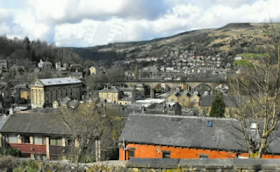Can you find a unifying language that cuts across age and income and culture that will help people help themselves to find a new way of living, see spaces around them differently, think about the resources they use differently, interact differently?
The answer would appear to be...
“Yes!”
The result would appear to be a town that transformed
from this...
to this...
from this...
to this...
from this...
to this...
Food.
Pam Warhurst wanted to start a revolution and she’s done just that with Incredible Edible, a local food partnership that encourages community engagement through local growing. Pam turned her small rural market town of Todmorden, England into a tourist attraction known for its edible landscape. Where some towns have concrete, gravel, dirty with dog doody, and bushes Todmorden has planted berries, fruit trees, corn, tomatoes, eggplants, herbs, and any other edibles you can think of.
This program has not only beautified the community, it’s FED THEM and taught them how to feed themselves, locally!
What’s more Pam pushed aside all the traditional bureaucratic actions that stop a revolution. Think of it if you will as that neighborhood in some communities where they've gone all out on Christmas decorations. It starts with one house and then another and another, and next thing you know the whole community.
With a similar approach Pam and her pals did not consult. They did not write a report. They did not ask permission. They met around a kitchen table, shared the idea at a community meeting and just started a movement that spans across age, income and culture.
Their mottos is: If you eat, you're in!
Once she started she found that people are ready and want positive actions they can engage in, and in their bones, they know it's time to take personal responsibility and invest in more kindness to each other and to the environment.
What’s more Pam and her volunteers tapped into the talents, passions, and interests of the community. Some people loved planting and gardening and so they laid and sowed the seeds. Others cooked, so they picked the food seasonably and brought it to the church, pub, or wherever people are living and cooked up the food. There are artistic people in the community doing some fabulous designs with the food and others who like to organize and make signs and sense of things which she explains is important because there are so many people that don't really recognize a vegetable unless it's in a bit of plastic with a bit of an instruction packet on the top. So some people construct signs explaining, "If it looks like this, please don't pick it, but if it looks like this, help yourself."
Artistic Peacock Topiary
Curbside cauliflower
It is not just about educating children. Pam explains that we must encourage all our schools to take this seriously. She suggests that every school create a sense of purpose around the importance to the environment, local food and soils. If we put that at the heart of our school culture we can create a different generation of children that choose to matter, choose to create the sort of shifts in behaviour we need to live within the resources we have, stop us from thinking like disempowered victims and start taking responsibility for our own futures.
Her battle cry was heard all all these schools responded to her call to action.
With Skype, you can connect with the students and staff at any of these schools and allow them to inspire you and your students to engage in work that is worthy of the world. You can connect with others doing this work on Facebook here.
The challenge
When you go back to school this year, watch Pam Warhurst’s TED Talk and see how you can start your own edible garden making a difference in your school, your community and ultimately, our world.


I love this idea.
ReplyDelete